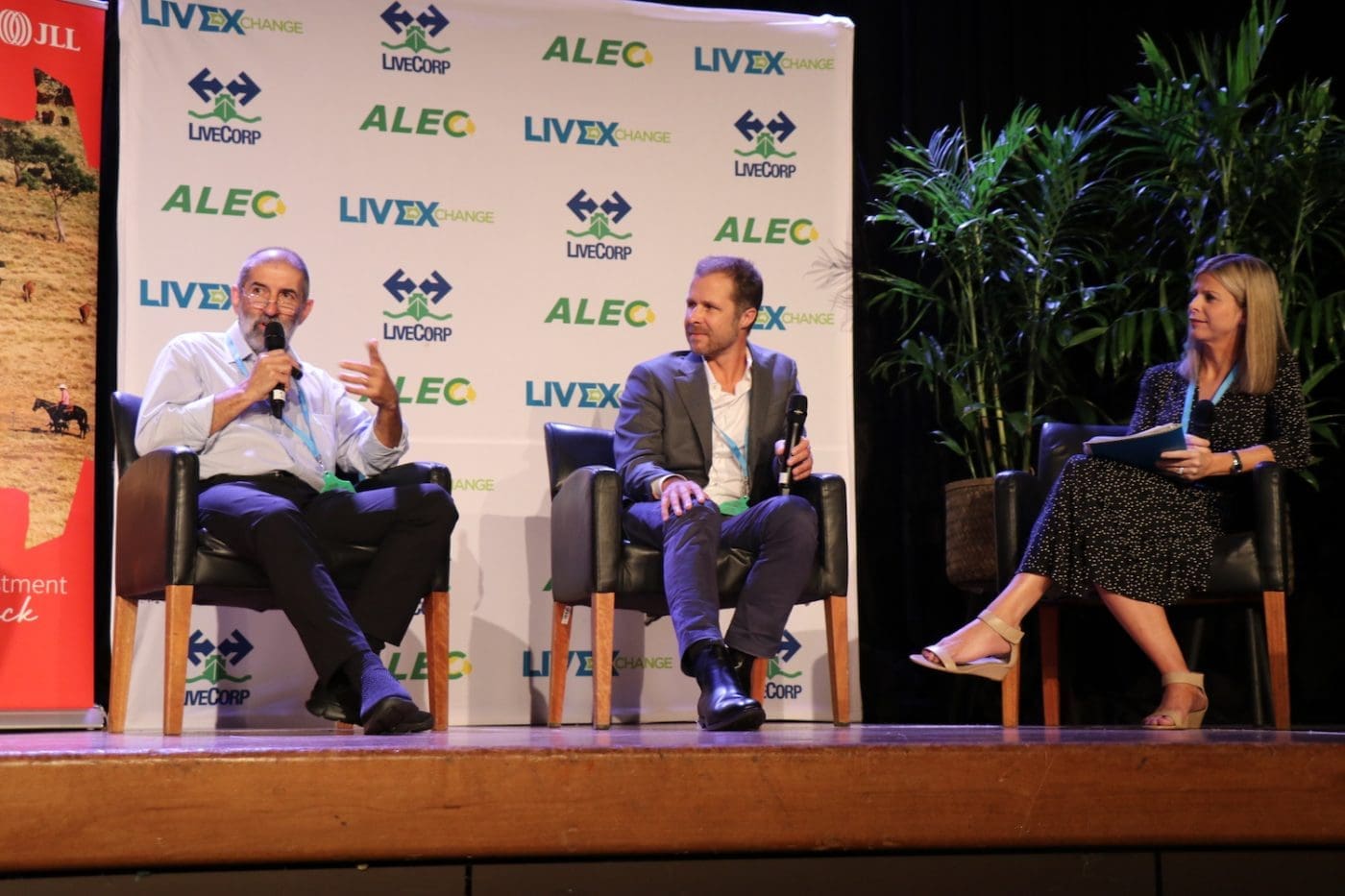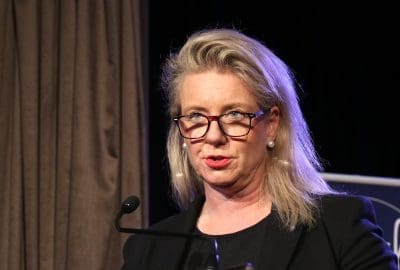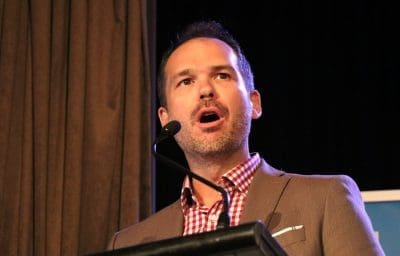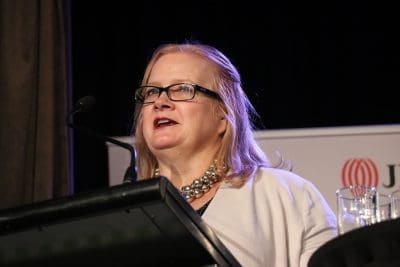
Dr Ken Harrisson, CareFlight; Mark Minchin, Minchin Moore and Sally McDow, CPR Partners, at the 2019 LIVEXchange Conference in Townsville.
2019 shaped as one of the most challenging years in the Australian livestock export industry’s history, but may have proven to be one of the most important for its future.
The year began with the trade facing a widely forecast Federal Labor election victory, an outcome that would have triggered a pledged phase-out of live sheep exports, and put additional pressure on the future of the cattle export trade.
However, a largely unpredicted Coalition triumph bought the industry more time to demonstrate that it is responding to Australian public concerns about animal welfare, and is committed to meeting community expectations.
There was plenty of evidence at the recent LIVEXchange conference in Townsville to show that industry leaders and stakeholders are taking that responsibility very seriously.
In one panel session a guest speaker and CareFlight doctor with expertise in emergency management, but with no connection to live exports, advised the industry that it needed to demonstrate that it was prepared to engage external, independent experts to oversee the trade.
 It was that sort of visibility the general public needed to see to develop trust the industry, Dr Ken Harrison (right) said.
It was that sort of visibility the general public needed to see to develop trust the industry, Dr Ken Harrison (right) said.
It turns out the industry has already committed to that step, as fellow panellist and lawyer Sally McDow, founder of CPR Partners, pointed out.
Ms McDow is one of Australia’s leading culture and reputation experts, and led a substantial review of the Australian Live Exporters’ Council (ALEC) last year.
One of the recommendations, she explained, was for the industry to create a code of conduct committee made up of independent parties with no financial interests in, and no connection to, the live export sector.
The code of conduct and a committee to oversee it is now in place, comprising a range of independent eminent Australians including veterinarians, ex-judges and former senators. The committee has the power to consider any potential breaches of the code and to make sanctions, which can include suspension or revocation of industry membership.
It is not just the industry that has committed to change but the regulator that oversees it as well.
An ‘unapologetically strong’ regulatory position
Melissa McEwen (right) from the Department of Agriculture said that after a year of extensive reviews of the live export industry and the Department’s role as the industry’s regulator (including the Moss, McCarthy and ASEL reviews, among others), the Department was now taking an “unapologetically strong regulatory position” on the trade in response to public concern and sentiment.
She said the public’s faith in the Department’s role as the industry regulator had been seriously eroded in recent years, and for the industry to maintain legitimacy, the Department also had to be seen as a legitimate regulator.
She also noted that Departmental staff had observed a clear change in the industry: “Talking to people who have previously regulated the industry, they have seen a change of attitude and change in approach,” Ms McEwen said.
“What I see our is that it is our job to help you maintain that social licence through strong collaborative regulation and to ensure industry continues to meet community expectations.
“Most of the major incidents tend to be multi factorial, a series of things, and by dealing with little things we can stop major issues and major regulatory failings.”
‘Significant transformation’
Veteran red meat industry market intelligence expert Peter Barnard, who chaired the final panel session of the two-day conference, commented on the “significant transformation” he has seen in the Australian Livestock Exporters’ Council in recent years.
“A code of conduct committee, a three month moratorium led by exporters, changes to ASEL standards (Australian Standards for the Export of Livestock) that will cost exporters money, but they believed in them because they are going to improve animal welfare.”
Meat & Livestock Australia managing director Jason Strong said the importance of the livestock export trade to Australia’s entire red meat sector had for too long been overlooked and undervalued, and stressed the vital role it plays needs to be more widely understood and recognised.
 Minister for Agriculture Bridget McKenzie reiterated the Coalition Government’s support for what has now evolved into ‘a technologically advanced and highly sophisticated industry’ worth $2 billion a year to the Australian economy.
Minister for Agriculture Bridget McKenzie reiterated the Coalition Government’s support for what has now evolved into ‘a technologically advanced and highly sophisticated industry’ worth $2 billion a year to the Australian economy.
“Of the 130 countries exporting livestock, ours has the highest standard of welfare,” she said.
“Animal welfare is at the heart of everything you do, the key is to communicate that to the broader community, and the point that Australia is not just exporting quality livestock to the world, it is also exporting its high welfare standards as well.”
She praised the recently launched Sheep Collective and Cattle Collective initiatives in helping to bridge that communication divide, by allowing the public to learn directly from people in the trade about how livestock exports operates in reality.
She said the recently passed legislation to create an independent inspector general of livestock exports will also provide an additional layer of assurance that the industry is meeting public standards.
 The LIVEXchange conference also heard how the industry is making progress toward the development of a Livestock Global Assurance Program, to further strengthen regulatory compliance systems and welfare accountability over and above ESCAS. In addition to this a number of exporters have already independent embraced additional welfare assurance systems, such as the CSAW system used by Frontier, SEALS, NACC and ILE (as detailed in this earlier article) and the Livestock One system developed by Austrex.
The LIVEXchange conference also heard how the industry is making progress toward the development of a Livestock Global Assurance Program, to further strengthen regulatory compliance systems and welfare accountability over and above ESCAS. In addition to this a number of exporters have already independent embraced additional welfare assurance systems, such as the CSAW system used by Frontier, SEALS, NACC and ILE (as detailed in this earlier article) and the Livestock One system developed by Austrex.
“A turning point”
Former federal agriculture minister and soon to step down chair of ALEC, Simon Crean, spoke of the industry having reached “a turning point”, and emphasised the need for all stakeholders to collectively work together to maintain high welfare standards.
“Individually you are great performers but collectively you can be far more successful,” he said.
 “The rising tide lifts all boats. We have a quality and reliability second to none.”
“The rising tide lifts all boats. We have a quality and reliability second to none.”
ALEC CEO Mark Harvey-Sutton told the conference the industry “had the right to be confident” based on its investment in strong animal welfare standards. He said the next step had to be moving into a regulatory space that rewarded good performance.
Beware the ‘Black Swans’
Despite the positive messages the industry was urged to continually look for “black swans”.
In medicine and in risk management, black swans are code for “things you can’t see”, Dr Harrison explained – unexpected events whose potential to occur only becomes apparent after they have happened.
“Do you have people who have nothing to do with your industry on your board?” Dr Harrison said. “
They are going to be the ones to spot black swans.”
“It has taken our industry, medicine, 30 years, but I don’t think you have 30 years.
“It is clear you’re changing but you’ve got to get on with it and you need to answer to independent experts.
“You’re a fool if you don’t think you’re vulnerable.”
Potential Black Swans on the horizon include the capacity that still exists for exporters to take risks with welfare in order to boost short term profits, and for producers to sell livestock to exporters without first checking their animal welfare standards.
While most exporters are clearly operating on a highly professional level and prioritising welfare above all else, is the industry doing enough to ensure all are meeting the same standards? Despite how much good has been acheived, one more “A Bloody business” or Awassi Express debacle may well be enough to sink the industry for good, in terms of its public standing.
That exported breeders are still not covered by a formal welfare assurance system like ESCAS presents another clear risk factor. Providing whole-of-life line-of-sight assurance for the welfare of an animal that may live for more than 10 years in the destination market is extremely difficult, but no member of the Australian public will care much for that excuse if they see more footage of Australian breeding cattle being cruelly treated in another country.

Voconiq co-founders and CEO Kieren Moffat addresses the LIVEXchange conference in Townsville last week.
Respectful conversations
Perhaps the strongest overall message from the conference was that the live export trade still has support in mainstream Australia, as evidenced by the initial research of independent public sentiment surveyor Voconiq, and that demonstrating the industry is genuinely responding to community concerns will be central to building trust in future.
Agricultural communication expert Kaaren Latham, who earlier this year became the communications manager at LiveCorp, advised people who rely on the live export trade not to shy away from having conversations with people who have a negative view of the industry.
“I’d encourage you not to step away from it, find out where they are coming from, listen to their concerns, be open to what they say, don’t try to educate them,” she advised.
“If you start talking from your values, if you are clear about what you do, from my experience they are reassured to know something is being done.”
Young Livestock Exporter of the Year John Cunnington said the aim should be to have “respectful conversations”.
“We have to learn how to have these respectful conversations, so if something is attacking us, we can say here is the information, make up your own mind.”
Peter Barnard said what most people want to see is that the industry truly cares.
“So often we respond with a technical answer along a technical dimension – the main thing we have to show and communicate is that we care and that we have an interest in these issues, we are responsive and are listening to what people are saying.”


